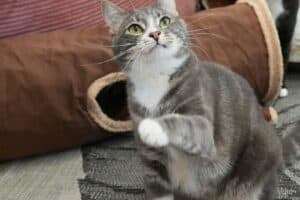People do not give sufficient credit to the intelligence aspect of pet birds and for this reason these creature can become bored fairly easily, which they indicate with a variety of behaviour patterns which are instinctive, repetitive, exacerbated but inappropriate for their owners.

In some instances the bird owners aggravate the problem by housing their pets in circumstances of solitary confinement. Pet parrots, in particular, enjoy witnessing all household activities and being part of the action offers visual, mental and emotional stimulation.
The basic idea at the outset of acquiring a parrot, parakeet, mynah and any other highly trainable bird is not to set a precedent that cannot be maintained for the rest of the bird’s life, so while stimulation is good, it must not be overdone in the beginning, as this may become a permanent expectation through early imprinting. Wait until the bird has settled in and reached puberty before increasing attention and stimulation so that it is perceived as a privilege and not an entitlement otherwise separation anxiety disorders will occur if people slacken in their indulgence when the novelty wears down.
Once the correct time has arrived, the single pet parrot or other kind of bird should then be placed in a room where most of the family’s household hubbub takes place.
Chewing and destructive behaviour does occur with boredom. If the bird has free rein in the room it will destroy anything it can grip in its beak which may include appliances, books and electrical cords. Birds also have to be taught discipline and certain boundaries and energy channelled towards good behaviour. This requires supervision, diligence, commitment and patience. Coupled with this, the bird must be offered safe, suitable toys and a wider variety of food. The latter may be offered in ways which requires foraging, searching and the opportunity to crack open shells for nuts, rip mealie kernels off the cob and tear open pods for peas.
Feather picking is caused by a few triggers in a bird’s life and one of them is a lifestyle of ennui. If the bird is plucking feathers and all medical causes are proved negative and separation anxiety is definitely not a predisposing factor then the parrot may be reacting to a tedious life. By picking at the feathers the bird has a release of endorphins in the brain giving it a degree of self-gratification thereby allowing it to cope with the stress of having no stimulation in an owner-induced prison.
Neglected birds can over-eat in compensation for owner neglect. They receive no exercise or interaction outside their cage and the people in charge compensate by giving more food, especially oily seeds, to keep them busy. This is particularly common amongst budgerigars that even develop hypothyroidism as a result of this.
Bored birds have energy to burn and they will find other forms of mischief. Some will shred paper and gravel sheets until they are torn to smithereens. In peach-faced lovebirds the shredding of paper and tucking the strips into its rump feathers is not boredom. This is an instinctive hen brooding behaviour showing a tendency towards nest building.
Boredom can lead to frustration. Frustration can induce aggression. If a bird bites its owner there has to be a reason.
There are many games that owners can play to keep a bird occupied. There are numerous items available to modify the bird’s behaviour so that it can forage, search, achieve and be kept busy. Whatever you place in a cage must be safe, non-toxic, indigestible and not threatening – you do not want the bird hiding from fear on the edge of its perch in the corner of its cage all day.
Support Local Journalism
Add The Citizen as a Preferred Source on Google and follow us on Google News to see more of our trusted reporting in Google News and Top Stories.






